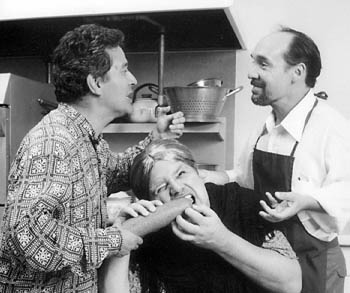![[MetroActive Stage]](/stage/gifs/stage468.gif)
[ Stage Index | San Jose | MetroActive Central | Archives ]
 Chow Time: Chicho (Jim Rodriguez), La Nona (George Mauro) and Carmelo (David Angelo) face the foodstuffs in 'La Nona.' Stuffing In 'La Nona,' a hungry grandma threatens to eat up her family's finances By Heather Zimmerman FOOD IS POWERFUL STUFF: beyond its basic life-sustaining properties, in literature, theater and film it has served as a stand-in for love, sex, wealth and control. In Roberto Cossa's La Nona, food looms symbolically large--getting sustenance becomes both necessary for survival and a threat to it. Teatro Visión opens its season with a solid production of Cossa's dark comedy about being devoured by appetite. In Buenos Aires, Argentina, in the late 1970s, the Spadone family struggles to make ends meet but is still reasonably happy. The head of the family, Carmelo (David Angelo), hopes to someday parlay his produce stall at the market into a small store. But the old Italian grandma of the family, La Nona (George Mauro) lives to eat--so ravenous is her appetite that feeding her has become the worst of the family's financial woes. Compounding the problem is Carmelo's brother, Chicho (Jim Rodriguez), who actively shuns a paying job to stay home and write tangos, which he rarely finishes and never sells. Chicho starts the family on the road to ruin when he cooks up a scheme to rid the household of the insatiable Nona and thus save himself from having to get a job. He determines to marry her off to Don Francisco (Cesar E. Flores), the owner of the local candy shop, and he seals the deal by concocting a tale of a vast inheritance and of Nona's failing health. Cossa's comedy is broad and gets broader as the family's desperation to get rid of Nona increases. Director Johnny Warriner keeps the pace lively, at almost a slapstick pitch, although the cast plays it effectively straight to Mauro's delightfully over-the-top Nona, who has a single-minded silliness reminiscent of Jonathan Winters deadpanning it in old-lady drag. Angelo and Rodriguez play well off of each other as the long-suffering Carmelo and the stubbornly lazy Chicho. Yolanda Cotterall brings a touch of poignancy to the play in the thankless role of the sad spinster aunt, Anyula. Cossa wrote La Nona as an allegorical indictment of the brutal military dictatorship that ruled Argentina in the 1970s, but in present-day Silicon Valley, the play seems more literal on the matters of food and shelter: La Nona's voracious appetite could easily be the Bay Area housing market, gobbling up money for shelter that was needed for food or clothing. Initially, Chicho appeases Nona, sneaking her snacks and sharing his dinner, but only when his own comfort and well-being becomes threatened does he think about curbing her appetite, and so it may be with local governments and the housing market--that still remains to be seen. But Cossa clearly shows the hazards of feeding the beast just to mollify it; whether it's the appetite of fascism or greed, such mob forces grow fat on fear or apathy, but can never be satisfied, even to the point of devouring those they feed on.
La Nona plays Thursday-Saturday at 8pm through Oct. 21 at the Mexican Heritage Plaza, 1700 Alum Rock Road, San Jose. Tickets are $10-$14. (800.642.8482) [ San Jose | MetroActive Central | Archives ]
|
From the October 19-25, 2000 issue of Metro, Silicon Valley's Weekly Newspaper.
Copyright © 2000 Metro Publishing Inc. MetroActive is affiliated with the Boulevards Network.
For more information about the San Jose/Silicon Valley area, visit sanjose.com.